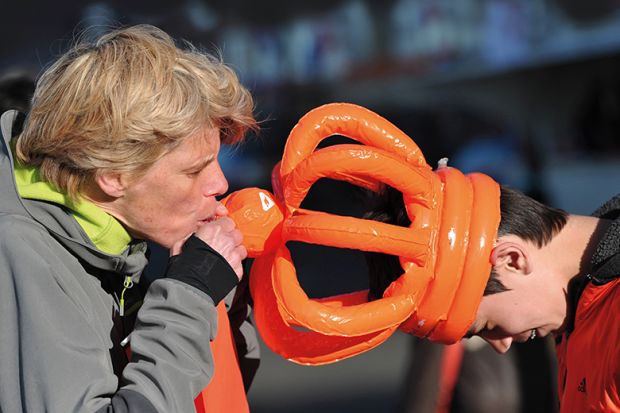A backlash in the Netherlands against teaching in English could spread to other countries, observers have predicted, after Dutch universities published a new strategy to deal with concerns over poor quality teaching and the alleged erosion of Dutch culture.
There has been a long-running debate on the language of teaching in the Netherlands, where three-quarters of master’s programmes at research universities are in English only. But in the past few weeks the issue has come to a head.
In a new internationalisation strategy, the Association of Universities in the Netherlands (VSNU) proposed separate number caps for English-speaking students on dual-language courses to prevent them squeezing out Dutch students, a solution now also being mulled by the minister of education.
Universities will also offer Dutch students training in their native tongue to maintain their language skills while they study in English.
Pieter Duisenberg, president of the VSNU, said that it was an attempt to deal with “strains on the system” caused by a “rapid” growth of overseas students since a push for internationalisation began in 2013-14.
But he stressed that “it’s in the DNA of our universities to be international” and that the association expects international student numbers to grow significantly to 2024-25 as the number of Dutch students drop off for demographic reasons. He said that he expected “minimal” change in the proportion of English-language courses.
At bachelor’s level, 23 per cent of courses are English-only, and a further 12 per cent of students can choose their language of study.
But the universities’ solutions may not satisfy critics. Ad Verbrugge, chair of Better Education Netherlands (BON), an association of teachers from schools, universities and other institutes that campaigns to promote education quality, said that there was a risk that Dutch students would no longer need the language at university to succeed, which would mean that “Dutch becomes obsolete”.
“It would imply that our language is becoming more and more a language of ordinary people” rather than the educated, he said.
He repeatedly stressed that the organisation was not against English as a language, and that his concerns had “nothing to do with drawing ourselves back behind the dykes”. “It’s about the diversity of Europe, which is under threat right now,” he said.
BON is currently taking Maastricht University and the University of Twente to court over the issue, with a decision expected shortly. The association wants English to be used in courses only where there is an “educational” reason – rather than an economic one – such as in research master’s courses, he said.
The lure of overseas students had created a “perverse incentive” for Dutch universities to teach in English, said Mr Verbrugge.
Another complaint is that English teaching has been of low quality; the new VSNU proposals stress that universities need to make sure that lecturers’ English is up to scratch. “It’s a race to the bottom,” Mr Verbrugge said. Rather than English, students were taught “globish”, he argued, referring to a simplified version of the language.
He said that he thought resistance to switching to English could spread across Europe. “A lot of colleagues from abroad are writing to me and supporting our cause,” he added.
“When you don’t take care of...tradition and language then the culture is under threat,” he said. “I can see people in Germany, Belgium, Italy, [and] France react[ing] to that,” he said.
Research published last year by the European Association for International Education and international study platform StudyPortals found a 50-fold increase in the number of English-medium bachelor’s programmes being offered by universities on the Continent in eight years, with 2,900 such courses on offer. English-language study is even more common at master's level, with a 2014 study putting the total of these programmes at more than 8,000.
Hans de Wit, director of the Center for International Higher Education at Boston College, said that part of the Dutch opposition to English-language teaching came from a “nationalist populist” argument about English threatening the native language. “You see it in Denmark, a little bit in Germany”, and also Italy, he said, where the constitutional court decided last year that teaching exclusively in English violates the constitution.
But concern over standards and fears that universities were becoming more “business orientated” in their drive to recruit international students “came from the academic community itself”, Professor de Wit said.
In the Netherlands, “every week there is headline news” about the English teaching issue - the country was having a “unique” debate over the internationalisation of universities, he said.
“The Dutch have been more extreme at using English as the language of teaching” than other states, he said, adding: “Other countries will look carefully at what is happening.”
POSTSCRIPT:
Print headline: Dutch seek curbs on anglophone students
Register to continue
Why register?
- Registration is free and only takes a moment
- Once registered, you can read 3 articles a month
- Sign up for our newsletter
Subscribe
Or subscribe for unlimited access to:
- Unlimited access to news, views, insights & reviews
- Digital editions
- Digital access to THE’s university and college rankings analysis
Already registered or a current subscriber?








